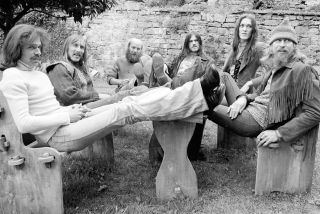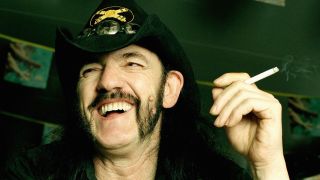The world of rock music today mourns Motörhead’s iconic leader Lemmy Kilmister, who died yesterday just 48 hours after learning that he had developed an aggressive form of cancer. Kilmister had turned 70 on Christmas Eve, celebrating the milestone with a star-studded party and concert at the Whisky A Go Go attended by members past and present of Guns N’ Roses, Metallica, Anthrax, The Cult and many more.
Besides an ability to compose consistently memorably yet grittily dirty hard rock songs, and to deliver them in his own unique manner, the combination of that gruff voice, his hellraising persona, a rapier-sharp wit and take-no-shit plain-speaking earthiness rendered Kilmister immensely popular with peers and fans alike. But he also transcended mere ghettoisation. Celebrated as a genre-defining figurehead, Motörhead’s songs and indeed Lemmy himself have appeared in adverts for Kronenbourg 1664 lager – a drink he disliked! – and, perhaps more memorably still, for Kit Kat biscuits, its be-warted protagonist playing a violin, and also selling policies for Axa Equity & Law.
You seek a likeable outlaw rogue-type figure? Lemmy is your man. Look no further.
The fans loved Lemmy because he was a purist (the guy didn’t even own a computer). And he didn’t exactly suffer the presence of fools — those people were eviscerated. He had a long memory, and you crossed him at your peril. He described his own biological father as “the most grovelling piece of scum on this earth; a weasel of a man with glasses and a bald spot.” But Lemmy was fiercely loyal and intensely honourable. His longstanding touring buddy Biff Byford of Saxon says: “I knew Lemmy for 36 years – if you were his friend you were a friend for life.”
For most Classic Rock readers, Kilmister has cast an omnipresent shadow. Over the decades he was celebrated almost as a living, breathing totem to rock‘n’roll. I first interviewed him as an anxious journalistic hopeful in 1983, as the band promoted their Another Perfect Day album. Wide-eyed and starstruck, I fouled up by wondering aloud whether its single, I Got Mine, could be a hit.
“Only time will tell, but that’s kind of the point [of releasing it],” Lemmy responded patiently, with a metaphorical roll of his eyes. It was to be the first of many such interactions, and hopefully my questions improved. I know that he loved the fact that I named my first born son after him – Eddie Lemmy Selhurst Ling.
During the final months of his life, with concerts and tours being cancelled due to the increasingly frailty of his physical vessel, Lemmy found himself torn apart.
“There was a sense of, ‘Thank fuck for that’,” he said in what turned out to be his final interview with Classic Rock, referring to a completed show in St Louis, Missouri. “It’s bad to let people down. I hate it when it all becomes your fault, you know? Although there’s nothing I can do about it.”
Lemmy just wanted to keep on playing rock‘n’roll for as long as possible and luckily he got that wish. That he’d earned the right to do so was, of course, a no-brainer.
Through seeing the Beatles at the Cavern, aged 16, to spells with his own earliest groups The Rainmakers, The Motown Sect, The Rockin’ Vickers and Opal Butterfly, to a cherished spell working as a roadie for Jimi Hendrix, and a short yet incredibly productive tenure with Hawkwind’s classic line-up, Kilmister was a musical purist. His loss robs us of a perhaps a final link to the halcyon days of rock music’s birth.

When foolishly expelled by Hawkwind in 1975, for what has been termed ‘pharmaceutical differences’, the bassist exacted sweet revenge.
“I came home and fucked all of their old ladies,” he told me in the year 2000. “Not the ugly ones, of course… but at least four of them. I took great pleasure in it. Eat that, you bastards.”
Kilmister had famously intended to use ‘Bastard’ as the name of his next band, the group we now know and love as Motörhead. His defiant blueprint of deafening volume and fierce musical simplicity inspired the classic promise that: “If we move in next door to you, your lawn will die” and the band’s long term prospects certainly didn’t look too rosy. As the group’s lone factor of consistency, it’s nothing less than remarkable that Lemmy was able to steer them through four decades of existence, recording 22 studio albums along the way.
“My only real achievement is Motörhead,” he told me five years ago, adding with a self-deprecating smirk: “That and persuading people that I can play the bass, when really it’s touch and go. I cheat a lot, you know.”
Like many men of his vintage, Kilmister struggled to address his feelings. He never married — a relationship with Gil Weston, the late bassist of Girlschool, was among his most serious commitments — though perhaps due to his own paternal issues, Lemmy was intensely proud of his musician son, Paul Inder.
“If only for [the fact that] that he learned how I feel about him, the film [his autobiographical movie, 49% Motherfucker, 51% Son Of A Bitch] was a good thing to do,” he once said.
Kilmister disliked the term of heavy metal that the media foisted upon him, introducing each live show with the words: “We are Motörhead – we play rock‘n’roll.” He had no time for fads. During one of the band’s leaner periods it was proposed that Motörhead might benefit from opening up for masked US weirdos Slipknot.
“It’d depend how much [money] they offered, pride wouldn’t get in the way – it’s more about despair,” he responded with a typical mix of bluntness and candour. “I wouldn’t even have them supporting us if it was up to me.
“They’re not a rock band, they’ve got no tunes, no chords or choruses. They have no idea how to behave onstage, I just don’t see any redeeming features,” he continued. “Well, maybe one – they’re pretty good at disguises. I came from the Beatles and Little Richard, they come from the circus. Maybe I’m just too old to get it.”
It was typical Lemmy, a man aware of his place in the grand scheme of things. “Today’s rock stars are boring,” he informed your correspondent during another interview, this time with Metal Hammer in 2008. “Most of today’s bands would’ve had rocks thrown at them in the 1970s, they’d have been booed off.”
And yet there was also a slightly vulnerable side if you cared to look for it. I still recall the corners of his mouth rising slowly after thrusting a piece of paper containing the lyrics to 1916, the title track of Motörhead’s major label debut of the same name from 1990, under my nose. Sparse and forlorn, mourning the stupidity of war, the track represented something very different for Motörhead, and his wordplay (‘I heard my friend cry, and he sank to his knees/Coughing blood as he screamed for his mother’) was equally inspired. And yet still he sought affirmation and validation.
Sure enough, 1916 heralded an upturn in Motörhead’s fortunes, which would improve again during the current millennium. Their last half-dozen releases were capable of standing toe-to-toe with the ones the public tend to regard as career-defining, recorded with the line-up featuring ‘Fast’ Eddie Clarke and ‘Philthy Animal’ Taylor.
And yet, Kilmister’s health was becoming an issue. After having a defibrillator fitted, a spot at Germany’s Wacken Festival was abandoned after a mere six songs, the fallout causing the cancellation of a European tour. He was forced to give up the things that made life worth living, including Jack Daniel’s whiskey and smoking. But still he refused to give up the road.
“Sure, there are some days when you don’t feel like it, but I’m sure it’s just the same in [the world of] plumbing,” he once joked.
When, during the last Classic Rock exchange, I asked him to verbalise the sense of frustration he felt, Lemmy fired back a question of his own: “How old are you now, Dave?”
“I’m 52,” was my answer.
“Yeah,” Kilmister replied, emitting a slightly macabre chuckle, “so you’re still alright. It’s when you get to sixty that things start to go pear-shaped. Everyone thinks that becoming an older guy is easy, but you never consider it fully. It comes as quite a shock. But the thing is, I don’t want to give in to it.”
At the time of our conversation, Motörhead’s 40th anniversary tour loomed large, its 33-date routing due to take them through 14 different countries. Shortly afterwards, Lemmy appeared at the Classic Rock Awards looking worryingly frail and walking with a cane. He spoke at length to ‘Fast’ Eddie about the decline of ‘Philthy’, who would pass on during that same night. Taylor was just 61 years old.
Though Lemmy has addressed the possibility of the band continuing without him, it’s almost certain that the 40th anniversary dates will now not take place. How could they? “Motörhead is over, of course,” says drummer Mikkey Dee. “Lemmy was Motörhead.“
Back in 2010, Lemmy theorised proudly; “When Motörhead leaves, there will be a hole there that just can’t be filled. That’s fine with me; it means I’ve achieved what I set out to do – which was to make an unforgettable rock‘n’roll band.”
And at the end of our most recent conversation, we exchanged a pleasantry or two. Among the final words he spoke to me were: “Cheer up you bastard”, followed by that inimitable laugh.
I still can’t believe I’ll never hear him sing again.



